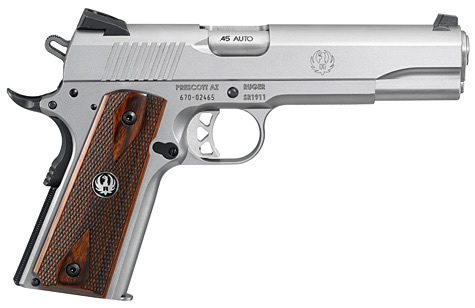 I get asked for advice on purchasing a handgun. Questions like “what should I get?” or “how do I go about buying a gun?”. Since most of our readership is in North Carolina, I will address the concerns that affect us here…
I get asked for advice on purchasing a handgun. Questions like “what should I get?” or “how do I go about buying a gun?”. Since most of our readership is in North Carolina, I will address the concerns that affect us here…
Selecting the right handgun for you.First, I will ask you, what your purpose is for having this new addition to your arsenal (whether or not it is your first or fifty-first makes no difference)? Most of the time it is people interested in buying a good concealed carry weapon (CCW). Occasionally it is a good night stand gun for home defense. Almost all the time it is that person’s first firearm purchase. So with all of that being said, I say, congratulations on your decision to exercise your second amendment freedom. Irregardless of what you are using the new addition for, I would advise you to go to a well stocked gun shop who has a great selection and good customer service. One of my favorites for both is WT’s in Goldsboro. If you are ready to buy now and there is a Gun Show near by, then I HIGHLY recommend going to the gun show. (There is one this weekend in New Bern, NC.) The great thing about a gun show is that there is all kinds of variety as well as very competitive pricing. There are some real bargains to be had! I would recommend that you go around and handle the weapons. Find the one that is the right caliber, look and feel. And most importantly, ASK QUESTIONS! The folks who give up their weekends to work a gun show are usually not rookies. They will give good sound advise. Now mind you, they want to sell you a gun, but there are 40-50 other vendors that have the same gun or close to it. Personally, I think it has to feel right in my hand and on my person. That is a make or break issue for me. Remember, this tool is your life-saving tool. It needs to be exactly what you want. Next, comes the question of caliber (ammunition size – The diameter of the bore of a firearm, usually shown in hundredths or thousandths of an inch and expressed in writing or print in terms of a decimal fraction; i.e. .45 ; or by millimeters: i.e. 9mm). Click here for more information on the caliber of a weapon/ammunition. I like anything between 9mm and .40 caliber in handguns. Some people prefer the .380 (a short 9mm round). The smaller the round, the better shot you may need to be. The larger the caliber, the bigger the hole, but the slower it hits. Weigh this option carefully and ask lots of questions. There are so many schools of thought on caliber out there, that I will spare you the details. But what it boils down to is that YOU have to make the decision, not someone else. Another consideration for caliber, will be the costs and availability of ammunition. Some are more expensive than others. Some are harder to get than others. Once you settle on a make, model and caliber, there are many online retailers that can ship to a local Federal Firearms Licensed (FFL) dealer at an affordable price. Check with your local FFL dealer to find out what the processing fee is for this type of transaction. Keep good notes on the models and the prices that you have found and many times you can use this a bargaining leverage, especially at a gun show.
How do I buy a handgun?
In North Carolina, if you do not have a Concealed Handgun Permit already, you will need to buy a Handgun Purchase Permit from you county’s Sheriff’s department. If you do already have a Concealed Handgun Permit then you will not need a purchase permit. Call your county Sheriff’s department for exact details. Costs may vary from county to county. At the time of purchase, you will be asked to produce either your Handgun Purchase Permit or your Concealed Handgun Permit. The Purchase Permit is only good 1 per gun. The Concealed Handgun Permit has no limitation on quantities. You will then be asked to fill out an ATF Form 4473 prior to finalizing the sale. Read and answer the questions carefully and honestly.
The Gun Control Act of 1968 prohibits certain people from possessing a firearm. The possession of any firearm by one of these “prohibited persons” is a felony offense. It is also a felony for any person, including a registered Federal Firearms Licensee to sell or otherwise transfer any firearm to a person knowing or having “reasonable cause” to believe that the person receiving the firearm is prohibited from firearm possession. There are nine categories of persons prohibited from possessing firearms under the Gun Control Act:
- Persons under indictment for, or convicted of, any crime punishable by imprisonment for a term exceeding one year;
- Fugitives from justice;
- Persons who are unlawful users of, or addicted to, any controlled substance;
- Persons who have been declared by a court as mental defectives or have been committed to a mental institution;
- Illegal aliens, or aliens who were admitted to the United States under a non immigrant visa;
- Persons who have been dishonorably discharged from the Armed Forces;
- Persons who have renounced their United States citizenship;
- Persons subject to certain types of restraining orders; and
- Persons who have been convicted of a misdemeanor crime of domestic violence.
With limited exceptions, persons under eighteen years of age are prohibited from possessing handguns. All of these categories are filtered when applying for either of the above permits.
Once you have purchased what to do…
- The first thing I do with a new gun is CLEAN IT. Yes, before any shots are fired through it, I field strip and clean the gun. Refer to your owner’s manual that came with the gun for details on how to do this (the right way). You will want to make sure you get rid of any packing grease and leave the recommended amount of lubricant on the surfaces your owner’s manual says to lubricate.
- Practice, practice, practice… If you are an experienced shooter, schedule some time at the range. If you are new to this, contact us and we will schedule a one on one training session with you.
- Become intimately familiar with your new gun. Read and re-read the owner’s manual. Know how to handle situations such as hangfires, misfires, squib rounds, stove pipes, etc. (These should all be covered in your owner’s manual). Learn how to do emergency reloads (from an empty weapon), field reloads and administrative reloads. Practice drawing a cleared weapon. Field Strip and re-assemble several times. KNOW YOUR GUN inside and out! Again, if this is overwhelming to you, contact us and we will schedule a one on one training session with you.
- Have a plan. Regardless of where you are, always have a plan. “What-if” exercises in your mind will train you to always think ahead. As I said before, contact us and we will schedule a one on one training session with you to help you develop a solid plan of defense in your home, business or other location.
- Have a means of secure storage when not in use. Best practice is to have some sort of lockable safe that can be opened quickly in case an armed response becomes necessary.
- Maintain your gun as directed by your owner’s manual.
Most importantly, be an extremely safe, competent and responsible firearms owner. Know the laws (see North Carolina Firearms Laws). If there are any children in the picture, you must make sure that they have no access to any firearms. You should have been given a handout regarding this when you made your purchase.
This list is not all-inclusive but it should get you on the right track. Reply to this post and let me know what kind of gun you purchased. Good shooting!

